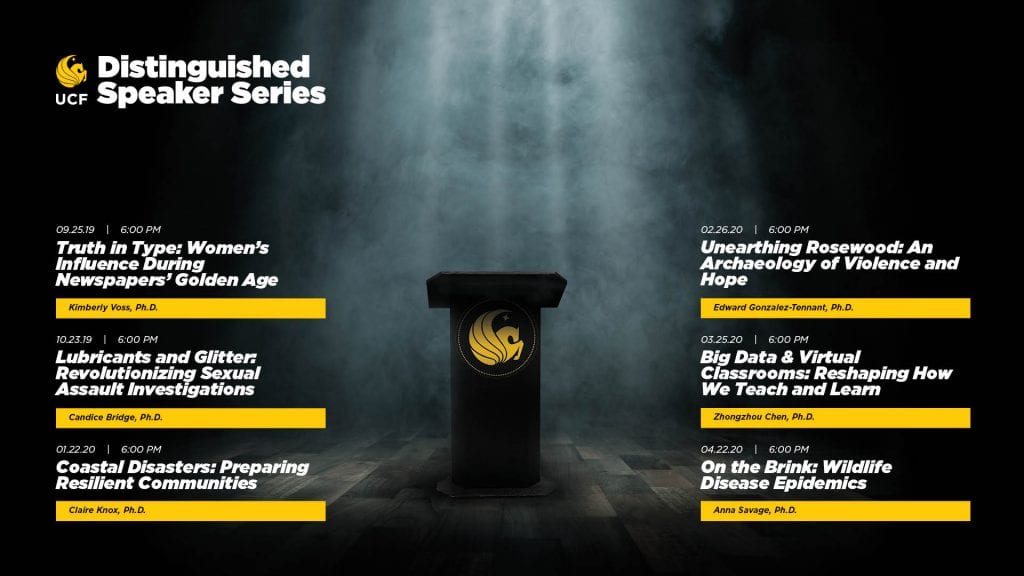Glitter, Hurricanes and Amphibians Among Topics of ’19-20 Distinguished Speaker Series

The College of Sciences Distinguished Speaker Series brings renowned speakers to enrich the lives of members of the Central Florida community. You don’t need to be in a classroom to learn the latest technology or hear the latest findings of our cutting-edge research. Our speakers will address topics relevant to the natural, computational, social or behavioral sciences and to the societal implication of developments in these fields.
All talks are held at: Tuscawilla Country Club, 1500 Winter Springs Blvd., Winter Springs, FL, 32708.
- 09.25.19 | 6:00 PM
Truth in Type: Women’s Influence During Newspapers’ Golden Age
Dr. Kimberly Voss tells the stories of significant women’s page journalists who contributed to the women’s liberation movement and the journalism community. Previous versions of journalism history had reduced the role these women played at their newspapers and with their readership—if they were mentioned at all. For decades, the only place for women in newspapers was the women’s pages. While often dismissed as fluff by management, these sections documented social changes and encouraged women’s roles in the public sphere.
These women’s page editors were smart, feisty and ahead of their time. They left a great legacy for today’s women journalists. The author of multiple books on this topic, Voss will discuss the significant roles these women played in the post-World War II years, laying the foundation for a changing role for women.
- 10.23.19 | 6:00 PM
Lubricants and Glitter: Revolutionizing Sexual Assault Investigations
While DNA is the go-to forensic evidence in sexual assault cases, the reality is the use of condoms is increasing in an effort to minimize the type of DNA left at the crime scene, e.g. sperm/semen. In the absence of DNA, it is necessary to identify other types of evidence that could be used to link the three points in the criminal triangle: victim, suspect and crime scene.
One type of evidence that has not been explored is lubricant analysis. Creating a comprehensive lubricant database with traits like silicone or water bases and flavorings, crime scene analysis can provide more clues for investigators to search for. Another type of commonly overlooked evidence are cosmetic particles that may transfer during physical contact, e.g. glitter and shimmer particles.
This talk will discuss current efforts underway to understand the evidentiary value of lubricant and cosmetic evidence and appropriate analytical methods to analyze and characterize unknown samples collected in a sexual assault or physical assault cases.
- 01.22.20 | 6:00 PM
Coastal Disasters: Preparing Resilient Communities
In the U.S., we continue to see an increase in billion-dollar disasters. The 2017 Hurricane Season — most notably Harvey, Irma and Maria — caused an estimated $300 billion in damages and tested those communities’ disaster resilience. Long-term recovery planning is an essential element of a community’s resiliency. However, the majority of local governments lack the capacity for long-term planning, which has led to repeated policy and organizational failures during and after disasters.
Dr. Claire Connolly Knox, an expert on post-disaster resilience planning and policy, will present the results of her research with examples from Florida, Louisiana and Texas.
- 02.26.20 | 6:00 PM
Unearthing Rosewood: An Archaeology of Violence and Hope
Rosewood was a prosperous African American community hard-won from the swampy hammocks of north Florida. Although the town was destroyed in 1923, the community continued, scattered across the state of Florida and beyond. Now, nearly 100 years after this tragic event the story of Rosewood remains shrouded from public view. Those who have heard of Rosewood are rarely aware of the community’s deeper history, or its relation to other places across the state.
Dr. González-Tennant will discuss the role of archaeology and geospatial sciences in unearthing Rosewood’s complex history. In addition to describing how digital technologies aid traditional archaeological methods, he’ll discuss the importance of outreach and its ability to support a public conversation on racial reconciliation.
- 03.25.20 | 6:00 PM
Big Data & Virtual Classrooms: Reshaping How We Teach and Learn
Can a new piece of technology change the way we teach and learn? This claim dates back to the invention of “educational-radio” in the 1920s. Yet most of the lecture halls today still look very much the same as those several hundred years ago. What is the evidence that the latest advancements in online learning technology are any different from all its predecessors, and holds the potential to finally change teaching and learning at scale?
In this talk, Dr. Zhongzhou Chen will share his vision of how online learning and big data-based educational research could significantly re-shape some of the fundamental building blocks of teaching and learning today. Changes ranging from courses, textbooks, assessments, grades, to schools and credentials. Those changes can substantially transform the traditional course-based learning experience. This would be similar to taking an out dated public transportation system that moves passengers between fixed locations according to a pre-determined schedule, towards creating an “intelligent highway system” of learning. This system would give every student the opportunity to become the driver of their own learning process, guided by GPS signals created from big-data based learning research.
- 04.22.20 | 6:00 PM
On the Brink: Wildlife Diseases Epidemics
Emerging infectious diseases are threatening wildlife populations worldwide, and the genetic, environmental and evolutionary drivers of disease emergence remain elusive. Cold-blooded animals appear particularly vulnerable to disease outbreaks, and this may be linked to their dependence on environmental temperature for maintaining physiological processes such as immune function.
In this talk, Dr. Savage will describe some of the ecological and evolutionary drivers of disease in frogs and sea turtles, including experimental and field-based analyses. Using genetic and genomic characterization of host and pathogen populations in an ecological context, she will highlight the immune processes that are contributing to disease emergence and persistence, emphasizing similarities and differences across diverse host species.
